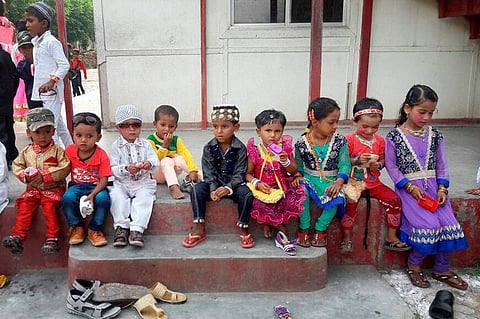

The Tamil Nadu State Council of Educational Research and Training (TNSCERT) recently released a draft version of the updated syllabus for pre-schoolers in the state. The highlight of this draft document — apart from getting rid of written work for children — is that school timings for pre-KG students have been extended from 12.30 pm to 4 pm.
The extension in timings has sparked reactions from various stakeholders in the society. While some parents welcomed the decision, academics and psychologists remain divided on the impact that this would have on the student.
For example, Poorvisha Ravi, a full-time employee and mother to a two-year-old son welcomed the decision of the TN government, and said that it is better for nuclear families where both parents work. She added that this would keep the child engaged in some activity.
“I would prefer to send my child to such places than daycare because firstly, they get to mingle with many kids of their same age. Most families these days have one or two kids, and there is not much scope for socialising. So, places like these help the kids make friends and develop social skills,” she said.
She also added that unlike a daycare centre, pre-KG classes in schools have children in the same age group and hence, the chances of the child facing bullying are rare.
This is exactly what drove TNSCERT to revise the existing guidelines for pre-schoolers.
Speaking to TNM, Manivel, the Deputy Director of the project said that the main aim of extending the timings for kids was to shelter them in a safe environment until their parents came home.
“We have been getting a lot of representations from staff and parents about the safety of kids after 1 pm, according to the present model. In places where both parents are working and they live as nuclear families — with nobody else to take care of the kids — they worry a lot about the safety of their children,” he said.
Adding that the post-lunch session of the kids in pre-school consists of just nap, play and a music and dance session, Manivel said that it has been kept light just to keep the child active.
Karthikayani Murugan, a clinical psychologist with the Kovai Medical Centre Hospital also echoed the thoughts of Poorvisha, and said that children learn to verbalise more and have more social and peer interaction in a school environment. She said that this decision has its own set of pros and cons, and that the pros could slightly outweigh the cons.
“Communication skills — expressive, receptive and written — develop. Being in school also reduces boredom for the child. Since all children are of their age group, their physical energy and cognitive abilities are almost similar, it helps the child in being active,” she said.
She added keeping a child engaged physically drains the parent out, and more so if they work and come home after a long days work. “Schools these days provide food and beverages which are clean and nutritious, and hence I don’t feel anything wrong in the child spending a good portion of their day in the school,” she said.
However, there are concerns as to how this could affect the bonding between the child and its parents. R Shanthidevi, an academic with 21 years of experience in education and the correspondent of Sri Lathangi Vidhya Mandir Matriculation School, Pollachi said that she would not prefer pre-KG children to be in a school for such a long time each day.
“When a kid, all of 2.5 years of age, spends their day from 9.30 am to 4 pm in a school, the psychological separation from the parent at this tender age has a lot of possibilities of manifesting into serious learning and emotional issues later in their lives,” she said.
Adding that there are various skills that a child must develop in such a young age, Shanthidevi says that three hours -- from 9.30 am to 12.30 pm -- is more than sufficient for a child to develop these skills. A kid is tired by the time they go home from school, and there is hardly any time left for the parent and child to bond, she added.
“Having nap time in schools is fine but then the comfort and the sense of safety that a child has in its home, in its bed is totally different,” she remarked.
S Vandhana, a Chennai-based clinical psychologist also expressed her concern over the long hours prescribed in the draft syllabus.
“It is true that the child is kept active and engaged and that multiple skills develop for a child in school. But personally, I would not recommend such long hours in school for a young child," she said.
The draft syllabus prescribes similar things to be taught to the three kindergarten classes, and also sticks to oral learning methods. This draft is scheduled to be implemented from the 2019-20 academic year, and will be mandatory for all play schools in the state.
The draft syllabus is available in Tamil and English for public perusal on TNSCERT’s website and is open to feedback from the public till October 30, 2018. The feedback can be sent to awpb2018@gmail.com.